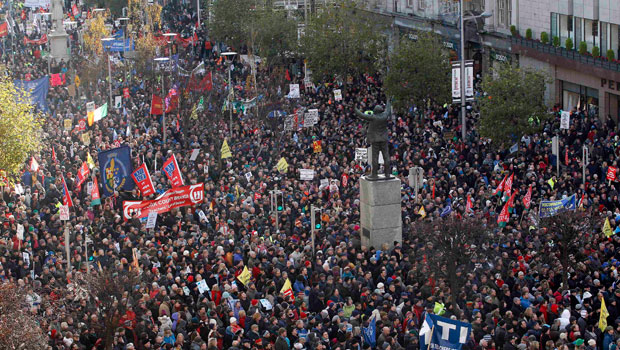Negotiators were holed up in a 250-year-old Dublin luxury hotel to finalize the deal, which the country needs to help it cope with mounting losses at state-owned banks and a massive budget deficit that will rise to nearly a third of total economic output this year.
The rescue, the second in the euro zone after Greece was bailed out in May, is expected to be announced after a teleconference of EU finance ministers at 1500 GMT on Sunday.
Thousands of demonstrators marched through the streets of the Irish capital to protest against the deal, which European leaders hope will calm markets and help put an end to a debt crisis that has shaken the 16-nation euro zone.
The fear is that investors could instead turn their attention to other high-deficit countries like Portugal or Spain, testing Europe's readiness to put up more taxpayer money to secure the future of its ambitious single currency project.
Irish opposition parties that are expected to take control of the government in the coming months said a deal would be unacceptable if the interest rate on loans from the EU and IMF was too high.
A media report late on Friday said the package could cost taxpayers as much as 6.7 percent a year, although the government denied the cost would be that high.
"If true, it would be an appalling capitulation by the Irish government," Irish Labour Party leader Eamon Gilmore told a party conference. "And it would be a betrayal of the founding principles of the European Union."
The government's Communications Minister Eamon Ryan told a radio talk show that the deal had not yet been sealed but that figure cited by RTE was "inaccurate" and the final rate would be lower.
Fine Gael, the main opposition party, has said it would consider any rate above 6 percent excessive.
Fine Gael and Labour are expected to rout unpopular Prime Minister Brian Cowen's Fianna Fail party in an election that is likely to take place within months. They have said they would be bound by any deal but may try to renegotiate details.
European officials have been at pains to play down the links between Ireland and Portugal, widely seen as the next euro zone "domino".
Because of its close economic links with its much larger neighbor Spain, they fear a market assault on Portugal could set off a chain reaction engulfing the euro zone's fourth largest economy and stretching the 750 billion-euro aid facility the EU and IMF set up after Greece was pushed to the brink.
"There are no parallels between Ireland and Portugal," Jean-Claude Juncker, who heads the group of euro zone finance ministers, told a Belgian newspaper.
Resistance to further bailouts runs particularly high in Europe's largest economy Germany, whose leader Angela Merkel has been accused of deepening the euro crisis by insisting on a new rescue mechanism that would make private bond holders shoulder part of the costs of future bailouts.
Berlin denied a magazine report on Saturday that it could agree to issuing joint euro zone bonds to help ease the debt crisis, an idea long pushed by Juncker.
A survey by polling group Emnid for Focus magazine showed Germans evenly divided on providing financial aid for countries like Greece and Ireland, with 48 percent in favor of assistance and 47 percent against.
In Ireland, opposition parties Labour and Fine Gael want bond investors who lent money to Irish banks to take on a bigger share of their country's bailout burden, rather than foisting it all on Irish taxpayers.
The downside of the plan is that it risks damaging confidence in other European banks and spreading the crisis.
Shares of European banks which hold the debt of Irish banks tumbled on Friday on reports that they could be forced to share in the cost. Britain's Royal Bank of Scotland and Lloyds Banking Group fell 5.3 and 4.4 percent respectively, while Spain's top bank, Santander, fell 3.7 percent.
The euro stumbled to a two-month low against the dollar, and the risk premiums investors demand to hold Irish, Portuguese and Spanish debt instead of rock-solid German benchmark bonds ended the week near record highs.
The Irish public has stoically borne two years of recession, a relentless surge in unemployment and a program of tax rises and spending cuts, but people say they are furious over the new measures and the decision to seek aid.
Saturday's demonstration was peaceful but boisterous, with thousands braving overnight snow to come by bus to the capital, some bringing along their children.
It was the biggest protest since at least early 2009. Police put turnout at 50,000. Unions said it was three times as big.
Marchers assembled at Dublin's General Post Office building, headquarters of a nationalist uprising against British rule in 1916. The prospect of handing sovereignty to Brussels has struck a tender nerve in a country where political discourse is still defined by the independence struggle against Britain.
"We are trying to reclaim our sovereignty before it's lost and before the IMF sell our natural resources and assets to the highest bidder," said Feilim Wakely, from County Louth, north of the capital, holding a sign that read "EIRE NOT FOR SALE".
Protests against austerity measures also took place on Saturday in Italy and Hungary.
Despite the latest round of cutbacks, Irish welfare benefits are still among the most generous in Europe and some analysts think Ireland has still not gone far enough in cutting back.
"The public are led to believe that sharp belt tightening is going on, when we've barely begun," said Societe Generale analyst Ciaran O'Hagan in a research note.










